Seville, February 22-23, 2024. The International Workshop on Citizen-centered health platform for cross-border regions (SALUS 2024) took place at the Lecture Hall of the School of Computer Engineering of the University of Seville.
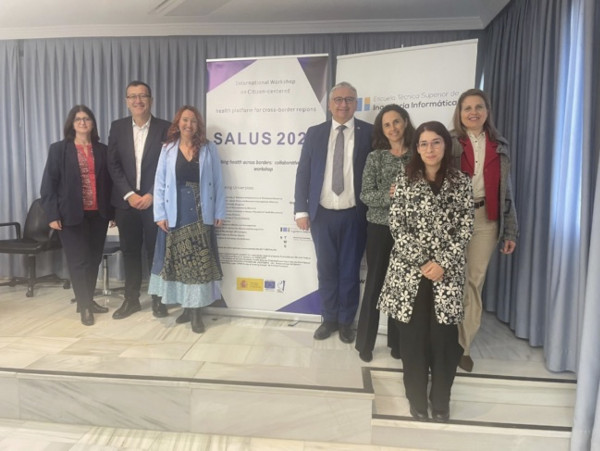
SALUS2024 promoter and organizer team. (Right to left) Natividad Martínez Madrid, Juan Antonio Ortega, Mª Carmen Romero, Ralf Seepold, Gloria Miró, Andreea M. Oprescu, and Betsaida Alexandre.
The scientific event SALUS 2024, organized by researchers from the University of Applied Sciences of HTWG Konstanz and the University of Seville, aimed to provide a forum for citizen-centered health discussions. Researchers, students, and other stakeholders collaborated to identify issues, opportunities, and solutions related to health in cross-border regions within Europe. Cross-border regions are defined as areas where social and economic exchanges occur across national borders. However, creating a regionally tailored and citizen-centered solution requires not only technical expertise but also political consensus to establish a framework, promote cooperation, and garner support.
An example of this collaborative effort is the multinational region covering mainly Spain, Portugal and the Western Balkan (and their neighbors). This international workshop, attended by experts from 15 universities worldwide, has led to numerous cooperative initiatives, generating executable strategies.
The challenges inherent in this collaborative effort can be categorized as follows:
(i) Social: Improve the delivery of citizen-centered health care.
(ii) Technical: Establish a digital platform to facilitate interconnection between citizens, service providers, and municipal stakeholders.
(iii) Economic: Develop sustainable long-term business models and value chains.
(iv) Political: Define and advocate for cooperation while supporting viable solutions.
The event, promoted by professor Ralf Seepold from HTWG Konstanz and coordinated by professors Juan Antonio Ortega and Mª Carmen Romero from the University of Seville, brought together more than a hundred participants who engaged in various sessions over the two days on-site and on-line, thanks to the local organization formed by professors Andreea M. Oprescu, Betsaida Alexandre, and Gloria Miró.
Several ongoing research projects related to the topic have been presented, such as Digital Epidemiological Investigation Modeling of 'Infodemic' in Social Media from South Korea, ARTIFACTS: generAtion of Reliable syntheTIc health data for Federated leArning in seCure daTa Spaces from Spain, Morpheus - Invasive - free system for measuring sleep from the Carl-Zeiss-Stiftung foundation in Germany, the ImpuLS-AI future proposal with Colombia entitled "Early and low-cost diagnosis of impulse control disorders in children and adolescents based on automated analysis of language and sleep patterns", and the German projects SLaH - At-home sleep laboratory and Smart Home & Living Association Baden-Württemberg, also presenting the BioLAGO Association - The health Network.
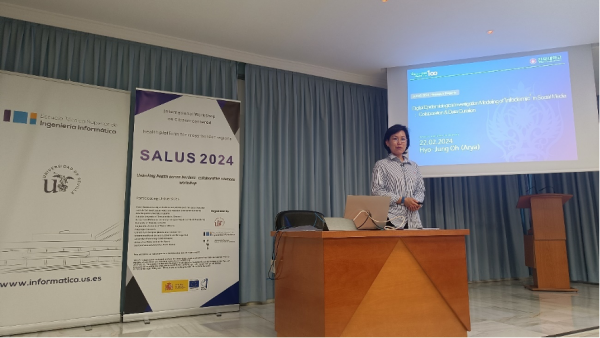
Prof. Hyo-Jung Oh (Jeonbuk National University, South Corea) presenting Digital Epidemiological Investigation Modeling of ‘Infodemic’ in Social Media
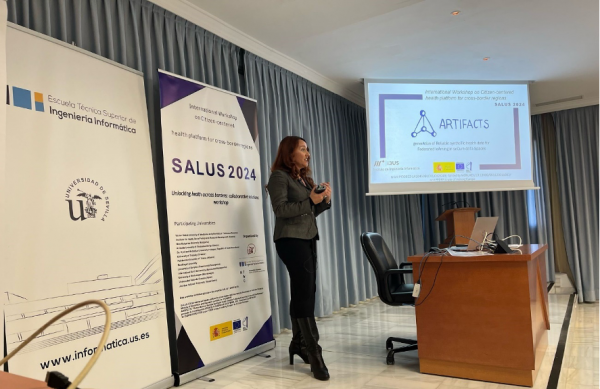
Prof. Mª Carmen Romero (Universidad de Sevilla, Spain) presenting ARTIFACTS: Generation of Reliable Synthetic Health Data for Federated Learning in Secure Data Spaces
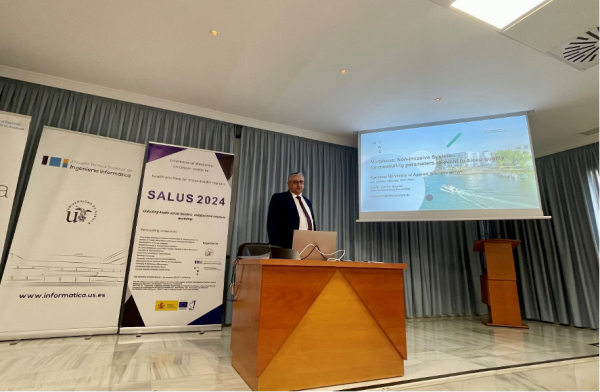
Prof. Dr. Ralf Seepold (Konstanz University of Applied Sciences, Germany) presenting the SALUS Project and the Morpheus Project
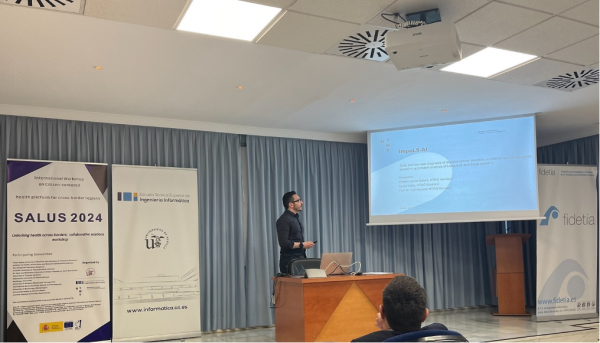
Daniel Vélez (Konstanz University of Applied Sciences, Alemania) presenting ImpuLS-AI's planned future cooperation with Colombia
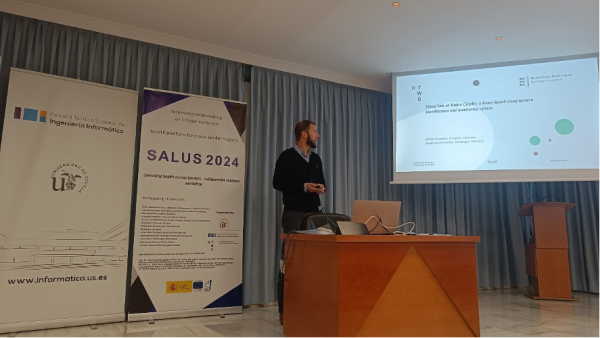
Dr. Maksym Gaiduk (Konstanz University of Applied Sciences, Germany) presenting SLaH – At-home sleep laboratory
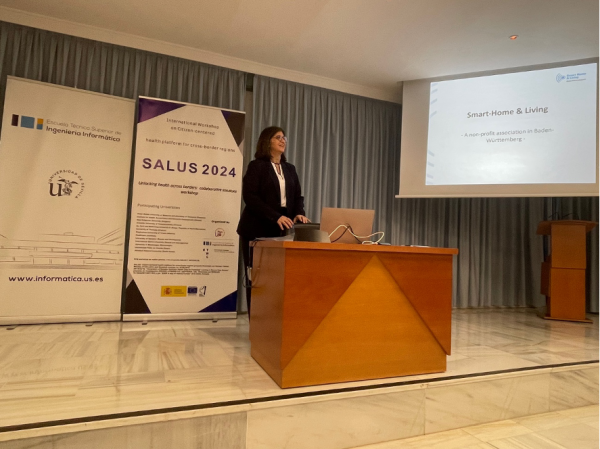
Prof. Natividad Martínez (Hochschule Reutlingen University, Germany) presenting Smart Home & Living Association Baden-Württemberg and BioLAGO e.V.
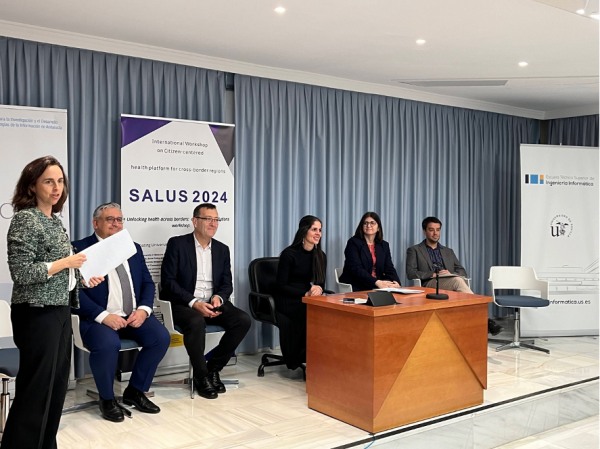
Round table about job oportunities, do you know it?: Researching, spinoff, self-employment, international, …. Chair Prof. Gloria Miró and Ralf Seepold, Juan Antonio Ortega, Áurea Simón, Natividad Martinez, and Luis Fernández-Luque as participants.
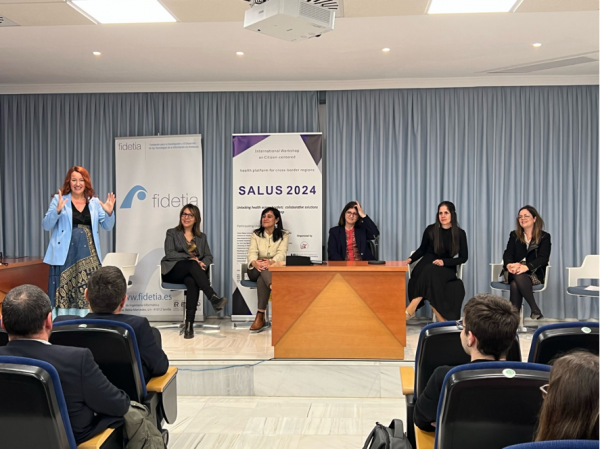
Round table about new strategies/opportunities in Heald. Chair Prof. Mª Carmen Romero and Ana M. Porcel, Marta Lima, Natividad Martínez Madrid, Áurea Simón, and Cristina Suárez as participants.
Success of this event is supported by the fact that the School of Computer Engineering has teaching and research staff with extensive experience in the application of Information Technologies in the Health sector. Furthermore, it offers the Health Engineering degree, where students receive specialized training in Health Informatics.
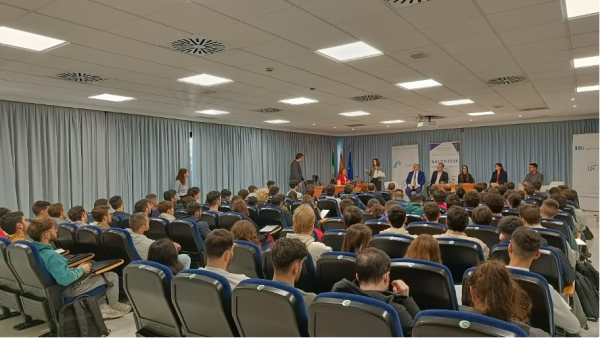
Lecture Hall of the School of Computer Engineering of the Universidad de Sevilla
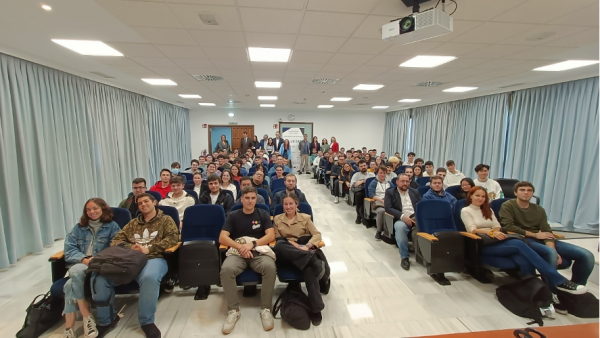
Family picture of SALUS2024 participants
General Chair: Prof. Ralf Seepold
Local General Chair: Prof. Juan A. Ortega & Prof. María del Carmen Romero
Local Organization Chair: Prof. Andreea M. Oprescu, Prof. Betsaida Alexandre and Prof. Gloria Miró Amarante
The SALUS and ARTIFACTS projects express gratitude to the entities that partially funded this international workshop:
- SALUS: Citizen-centered health platform for cross-border regions. Project funding by German Federal Ministry of Education and Research. Contract no: 01DS23010
- ARTIFACTS: “Generation of Reliable Synthetic Health Data for Federated Learning in Secure Data Spaces” Research project (PID2022-1410450B-C41 (AEI/FEDER, UE)) funding by MCIN/AEI/10.13039/501100011033 and “ERDF A way of making Europe” of European Union.

